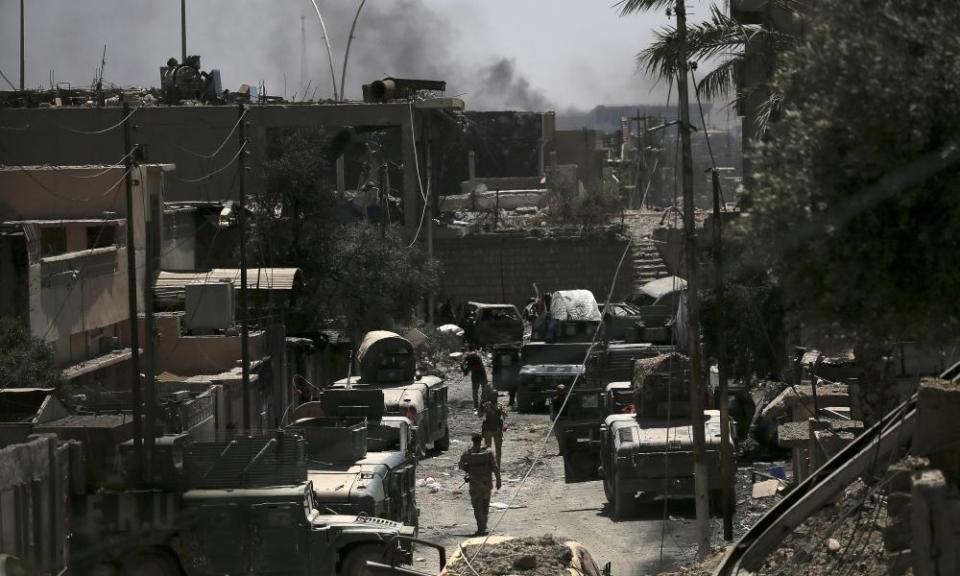British jihadis: who are the first generation of violent extremists? | Jason Burke

Amid the bile, the hate and the prejudice, western Islamic militants fighting in Syria occasionally reveal a less brutal side. In interviews and on social media, they talk about what they miss from their homelands.
A US recruit, the commander of an armoured unit, asked friends to send him packets of Swiss Miss hot chocolate powder. A Belgian jihadi, a baker, perhaps unsurprisingly confessed to missing good bread. And Omar Hussain, a Briton fighting with Islamic State, confessed in a Q&A session with supporters that he missed BirdsEye fish fingers and Jaffa Cakes. The 30-year-old, who said he hoped to die in a drone strike, also complained that Arabs in general do not know “where the red line is in giving another brother his space” or “how to queue”.
Hussain’s concerns and desires are of course quintessentially British – as Swiss Miss hot cocoa may be American and good galettes Belgian. They underline a key factor in the evolution of Islamic militancy today: though the ideology structuring the Islamic militant world view is supposed to transcend national concerns and characteristics, the “way of jihad” is pretty parochial in reality. Whether in Baghdad or Birmingham, Mogadishu or Manchester, Islamic militants shed much less of their previous cultural and social conditioning when they embrace “the cause” than they, or the ideologues of jihadism, would like to believe. Even the nom de guerre each one adopts indicates their national origins. Omar Hussain fights for Isis as Abu Sa’eed al-Britani, for example.
This is of crucial importance now because Isis will soon be forced out of its last major urban strongholds in the Middle East. Without Mosul or Raqqa, the group’s claim to have re-established a caliphate, which aims to unite the world’s Muslims within a single polity, will collapse. So, too, will its finances. Isis will then be reduced to what it once was: a very brutal and tenacious Iraqi militant organisation. The group’s offshoots around the world – including in Europe – will be cast loose and will henceforth evolve on their own.
Where there has been Islamic militancy for many decades – and this means much of the Middle East, south and central Asia, parts of Africa, too – there are long-established traditions of violent activism which will inform how they develop. Algerian militants will look to their predecessors, Somalis to theirs, and Pakistanis to those who fought over 60 or 70 years, and so on.
There is much that is shared between these different theatres of jihad, but there is much that is not, too. This seems obvious. Why would we expect militancy in, say, the Philippines to be the same as that in Somalia or Uzbekistan? They do not even speak the same language. If Wahhabi-style strands of Islamic observance have made inroads everywhere, longer standing religious traditions still inform practice in important ways in many places.
In continental Europe, the US and the UK, there is as yet no such long history of Islamic militancy, and thus no tradition to inform its evolution here. We have only really had 15 years of violence. We are still, just about, on our first generation of violent Islamic extremists. British Islamic militancy is a work in progress.
But, beyond militants who miss fish fingers and orderly queueing, some salient characteristics are becoming evident – and some differences with other western countries.
The nascent British tradition of jihad appears to involve fewer former convicts than is the case in France, where prisons have become the principal incubators of Islamic extremism, and fewer converts than in the US, where the total tops 40%.
On the whole, British militants appear poorer than those in the US, but slightly wealthier than those in continental Europe. A high proportion of British jihadis – including Salman Abedi, the Manchester bomber – appear to have been involved with gangs, or some kind of criminal activity, at one stage in their lives. This, however, is true in continental Europe too. There are also high levels of mental illness among British violent extremists, though it is impossible to say if these exceed those elsewhere.
In the UK, in contrast to France and the US, attackers rarely use firearms. The French way of jihad once involved a significant number of armed robbers and has long seen the use of automatic weapons. Attacks in the US have also used such weapons. In the UK – no doubt because of our tight gun laws – they do not.
The dynamics of Islamic militancy in western countries are also influenced by the origins of the immigrant communities from which the extremists emerge. This ranges from different styles of violent activism, to the activities of different existing militant groups, to the beliefs and cultural norms of the wider society.
Extremist behaviours, like anything else, mix these various elements. Listen to British jihadis: in videos, on Twitter, on Facebook or in more formal interviews. They use the street and gang slang heard in tough neighbourhoods with large immigrant origin populations, plus mispronounced Arabic words, with a scattering of poorly understood religious phrases referring to poorly understood Islamic concepts. This is not the language of global jihad, but of British jihadis.
A new form of militancy is emerging here. It is the British way of jihad.
Jason Burke is the author of The New Threat from Islamic Militancy

 Yahoo News
Yahoo News 